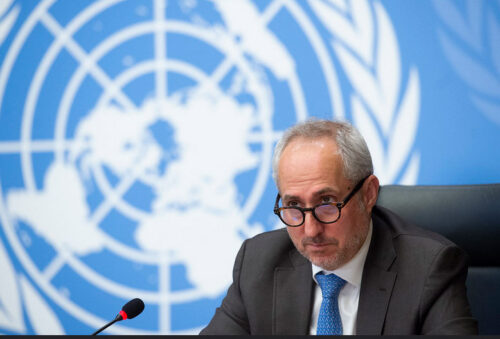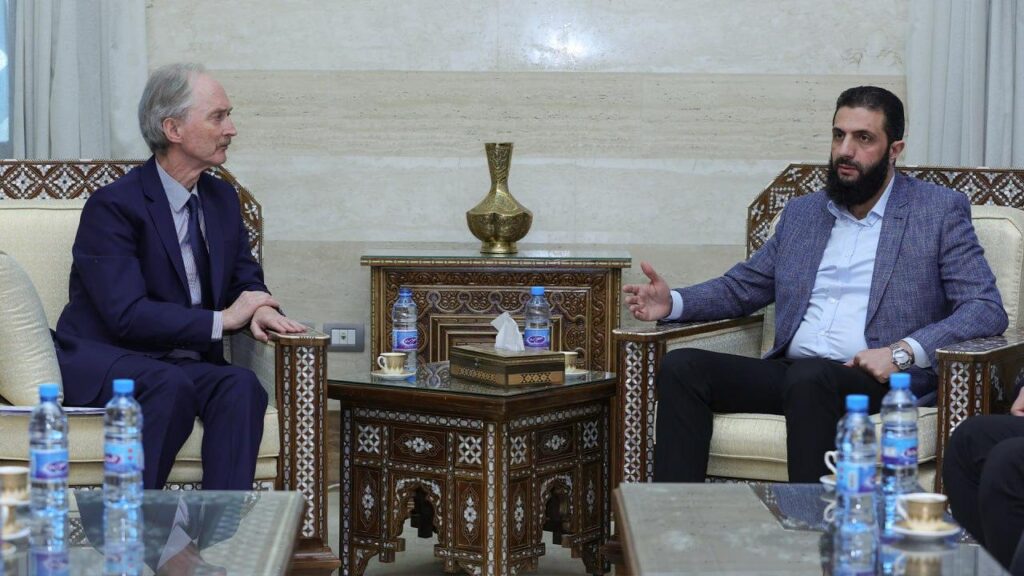
The UK government has refrained from condemning Israel’s breach of Syria’s sovereignty, following Israel’s invasion of the UN-patrolled buffer zone on December 8. This action violated the 50-year-old ceasefire agreement with Syria and came shortly after the militant group Hay’at Tahrir al-Sham (HTS) ousted the Syrian government from Damascus, further destabilising the region.
When asked by The Muslim News about Prime Minister Keir Starmer’s position on the Israeli seizing of Syrian lands in violation of the 1974 Disengagement Agreement with Syria, the PM’s spokesperson said, “We’re calling on all sides to protect civilians and ensure aid reaches the most vulnerable. Our focus, and the conversations we’re having—including the foreign secretary’s discussions with the UN special envoy, the Israeli foreign secretary, and other partners—are centred on finding a political solution and achieving peace and stability in Syria.”
The Foreign Office highlighted assurances from Israel that its presence in the buffer zone would be “limited and temporary.” A statement to The Muslim News clarified, “We have been clear that we expect them to adhere to this commitment. Israel’s presence in the buffer zone must not become permanent.” The UK’s position on the Golan Heights was reiterated: “They are occupied territory, and we do not recognise Israel’s annexation. We continue to call on Israel and all actors to uphold their obligations to peace, stability, and security under international law.”
However, Israeli Prime Minister Benjamin Netanyahu, who faces an international arrest warrant for alleged war crimes in Gaza, rejected the notion that the new occupation would be temporary. Speaking on December 17, Netanyahu announced that the occupied buffer zone would remain under Israeli control for the “foreseeable future,” seemingly intending to keep the territory under Israeli rule as long as possible. “We will stay… until another arrangement is found that ensures Israel’s security,” he stated.

Left: Israeli Prime Minister Benjamin Netanyahu visits the summit of Jabal al-Sheikh (also known as Mount Hermon) on the Syrian side of the border following Israel’s invasion of Syrian territory after the fall of Syria’s Baath regime on December 17. (Credit: Ma’yan Toaf/Israel GPO/AA).
Netanyahu made his declaration from the summit of Mount Hermon, which Israel Katz, Israel’s defence minister, described as “the eyes of the state of Israel to identify our enemies, both near and far.”
Defending the illegal incursion, Netanyahu argued that the collapse of a decades-old agreement necessitated action. “We will not allow any hostile force to establish itself on our border,” he said, alleging that Syrian troops had abandoned their positions.
Israel captured part of the Golan Heights during the 1967 war and later annexed it, a move deemed illegal under international law by most of the global community, with the US being a notable exception.
The US State Department echoed Israel’s position, asserting that the country has the “right to defend itself” and “to take actions against terrorist organisations.” However, like the UK, Washington has called for the occupation—which spans an area over twice the size of the Gaza Strip and lies less than 20 kilometres from Damascus—to remain temporary.
In stark contrast, the UN has condemned Israel’s actions. UN Secretary-General spokesperson Stephane Dujarric emphasised, “The agreement needs to be respected, and occupation is occupation—whether it lasts a week, a month, or a year, it remains occupation.”

Stephane Dujarric, Spokesman for the UN Secretary-General insisted Israel’s invasion is an illegal occupation. (Credit: Violaine Martin/UN)
The EU expressed significant concern over Israel’s invasion of Syrian territory. In a statement issued on December 9, the EU’s High Representative for Foreign Affairs and Security Policy, Josep Borrell, stressed the importance of respecting Syria’s territorial integrity and national sovereignty, stating, “The European Union calls on all parties to preserve Syria’s territorial integrity and national unity and to respect Syria’s independence and sovereignty.”
Moreover, the G7 leaders, including EU member states, reiterated these concerns in a joint statement on December 12, 2024. They stated, “We reaffirm the importance of respecting Syria’s territorial integrity and national sovereignty and stress the need for all parties to refrain from actions that could escalate tensions further.”
Iran and Russia, two of Assad’s key allies, have been particularly vocal in their condemnation.
Iran’s Supreme Leader Ayatollah Ali Khamenei called the attacks part of a larger conspiracy, stating, “The removal of al-Assad was orchestrated by the United States and Israel.” He stressed that such actions undermine regional stability and urged a coordinated international response. In retaliation, Iran has vowed to take countermeasures, considering the strikes a threat to its strategic interests in the region. While specifics of the response remain undisclosed, Iran’s leadership has indicated that preparations are underway.
President Vladimir Putin expressed his disapproval, saying, “Russia condemns the seizure of any Syrian territories. This is obvious,” while raising concerns about Israel’s military incursions, which have penetrated up to 25 kilometres into Syrian territory, approaching sensitive sites like former Soviet fortifications. Russian Foreign Ministry spokeswoman Maria Zakharova further condemned Israel, criticising its continued airstrikes on Lebanon and Syria. Despite widespread international calls for a ceasefire, Zakharova pointed out, “Israel continues its attacks on Lebanon,” highlighting Israel’s disregard for efforts to de-escalate and restore peace.
Israel’s plan to double the population of the occupied Golan Heights has also sparked widespread international criticism. The initiative, which allocates over $11 million, aims to increase the number of Israeli settlers in the region, currently home to 31,000 Israeli settlers and 24,000 Druze residents. Netanyahu defended the plan, stating, “This move is crucial for Israel’s security, especially in light of the ongoing instability in Syria.” He emphasised the need to strengthen the Golan Heights due to the “new threats” emerging from Syria after the collapse of President Bashar al-Assad’s regime.
At the same time, analysts suggest that Israel’s broader strategy in southern Syria revolves around territorial control, forming alliances with minority groups, and resource manipulation. Israel aims to position itself as a protector of minorities in areas like Sweida, seeking to control significant parts of southern Syria. A central element of this strategy is neutralising Syria’s military capabilities by preventing the acquisition of advanced weapons until a stable regime is in place. Additionally, Israel is focused on establishing a military presence to shape Syria’s future, capitalising on the country’s fragmentation and the potential creation of a Druze-majority canton. The Druze community is vital to Israel’s military strategy, while control over the Yarmouk River reflects a long-standing tactic of manipulating resources for geopolitical advantage.
This expansion plan has sparked condemnation from various international actors. Germany’s foreign ministry voiced opposition, stressing that the move is “illegal under international law,” urging Israel to reconsider its actions.
Turkey has, as expected, strongly condemned the expansion of settlements in the Golan Heights. The Turkish Foreign Minister Mevlüt Çavuşoğlu described Israel’s plan to double the Israeli population in the occupied Golan Heights as an attempt to “expand its borders through occupation.”
The developments escalated tensions between Turkey and Israel, with analysts warning that deteriorating ties could have destabilising consequences for the region.
In a statement condemning the move, the Turkish foreign ministry said, “This decision is a new stage in Israel’s goal of expanding its borders through occupation. This step by Israel is a source of grave concern, taken together with Israel’s entry into the area of separation, in violation of the 1974 disengagement agreement, its advance into adjacent areas, and airstrikes in Syria.”
The Gulf states, including Saudi Arabia, Qatar, and the UAE, have also expressed strong disapproval, warning that Israel’s actions could escalate tensions in the region.

The UN Special Envoy for Syria Geir O. Pedersen meets Hayat Tahrir al-Sham (HTS) leader Ahmad al-Sharaa in Damascus, Syria on December 15. (Credit: Syrian Transitional Government/AA)
In response, the new Syrian leadership under Ahmad al-Sharaa has chosen not to condemn Israel’s invasion of Syrian territory, instead prioritising the country’s internal reconstruction. “Our focus is on rebuilding Syria and restoring stability, rather than becoming embroiled in new conflicts.”
Following the ousting of al-Assad, the Israeli air force launched over 400 airstrikes across four Syrian cities, targeting military sites such as army bases, fighter jets, missile systems, airports, and warehouses, causing extensive damage, according to the Syrian Observatory for Human Rights. An Israeli security source described the operation as “one of the largest attack operations in the history of its air force.”
Israeli strikes disabled air defence systems and rendered multiple sites inoperable. The Barzeh Scientific Research Centre in Damascus was a key target, previously struck in a 2018 US-led attack over Syria’s alleged chemical weapons program. Residents reported heavy explosions across the capital.
In Latakia, airstrikes damaged an air defence facility near the coastal port, along with naval ships and warehouses. Attacks on military positions in Daraa killed two people.
On December 19, UN Secretary-General Antonio Guterres condemned Israeli airstrikes on Syria, calling them violations of the country’s sovereignty and territorial integrity. Guterres demanded that “all acts of aggression must come to an immediate end,” stressing that “Syria’s sovereignty, territorial unity, and integrity must be fully restored.”
Additional reporting by Ahmed J Versi
READ MORE